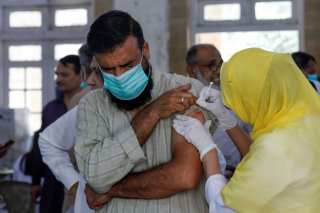Telemedicine Can Help Pakistan Beat the Coronavirus
The government of Pakistan should give active consideration towards adopting telemedicine as an indispensable approach of healthcare provision for outpatient cases in order to reduce the burden on the existing healthcare systems.
In the contemporary epoch of the coronavirus pandemic, ensuring adequate health security is the primary goal of governments of all nations. Amid this, the field of telemedicine can play a valuable role in contributing towards the health security of individuals by advancing convenience to both physicians and patients. In particular, in Pakistan, where a large population and a growing number of Covid-19 cases are depleting the available capacity in government hospitals, telemedicine can prove to be beneficial by lowering the number of outpatients in the premises of hospitals. Telemedicine entails remote diagnosis of patients, which requires no physical travel by the patient or the physician for diagnosis or treatment of the disease. Due to this reason, the majority of the private healthcare centers in major cities have already turned their healthcare facilities for outpatients strictly online during the pandemic. However, despite such inclination towards telemedicine, there are some hurdles that prevent the countrywide successful adoption of telemedicine in Pakistan.
The major hurdles in the nationwide provision of telemedicine are the poor internet connectivity and low technological literacy in Pakistani rural areas. Therefore, there remains a general hesitancy, especially among those residing in rural areas, to use telemedicine. These challenges can be resolved by designing and implementing a new policy for improving the provision of telehealth in the country. At present, there is no policy promoting or regulating the field of telehealth, and in turn, of telemedicine, in Pakistan. This gap needs to be fulfilled adaptively by laying out a framework for the provision of fast internet services to healthcare units and spreading 4G or upcoming 5G services to wider populations in the country. The designing of such a healthcare policy would also require the inculcation of technological recourses.
On the other hand, as far as the tech-literacy of people in rural areas is concerned, people can be made aware of telemedicine by nudging their behavior towards adopting online modes of consultation. This can be done by applying insights from behavioral science. For example, running advertisements on TV about the ease of using telemedicine, or circulating short and simply explained tutorials about using telemedicine, can prove to be vital in pushing people towards adopting telemedicine as their primary mode of healthcare consultation.
Lastly, the government of Pakistan should give active consideration towards adopting telemedicine as an indispensable approach of healthcare provision for outpatient cases in order to reduce the burden on the existing healthcare systems. Since Covid-19 has already crippled Pakistan’s healthcare structure, healthcare providers, patients, and the federal and provincial healthcare ministries should perform measures, such as collaborating with the internet service providers and public and private hospitals to ensure the provision of telemedicine to larger and more distant communities in Pakistan. This will further lead to improving the quality of healthcare provision in the country, as it has in the United States where patients have 38 percent fewer hospital admissions and 31 percent fewer re-admissions due to using telemedicine for healthcare. Regardless of the fact that Pakistan cannot replicate the United States’ quality provision of telemedicine given the latter’s far superior internet and technological literacy, taking small steps to improve its telemedicine capacity can prove to be beneficial for the healthcare system in Pakistan.
Nasir Javaid is a student of Master of Business and Public Policy at Lahore University of Management Sciences (LUMS). His core research areas are related to International Water Law, Water Management in the Indus Basin, Human Security and its seven dimensions, Information Warfare, and International Humanitarian Law. He tweets at @Nasir_Minhas
Shiza Khan is a certified pharmacist and a student of Master of Business and Public Policy at Lahore University of Management Sciences (LUMS). Her research interest areas relate to public health, telemedicine, and improving societal behaviors of people. She can be reached at: [email protected]
Image: Reuters.

